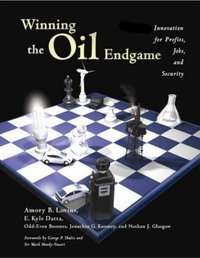Winning the Oil Endgame
 | |
| Author | Amory B. Lovins |
|---|---|
| Country | United States |
| Language | English |
| Publisher | Rocky Mountain Institute |
Publication date | 2005 |
| Media type | Print (Hardback & Paperback) |
Winning the Oil Endgame: Innovation for Profits, Jobs and Security is a 2005 book by Amory B. Lovins, E. Kyle Datta, Odd-Even Bustnes, Jonathan G. Koomey, and Nathan J. Glasgow, published by the Rocky Mountain Institute. It presents an independent, transdisciplinary analysis of four ways to reduce petroleum dependence in the United States:
- Using oil more efficiently, through smarter technologies that wring more (and often better) services from less oil (pp. 29–102).
- Substituting for petroleum fuels other liquids made from biomass or wastes (pp. 103–111).
- Substituting saved natural gas for oil in uses where they’re interchangeable, such as furnaces and boilers (pp. 111–122).
- Replacing oil with hydrogen made from non-oil resources (pp. 228–242).
Problems and solutions
The authors explain that the problems of oil dependence are manageable, suggesting that oil dependence is a problem we need no longer have. The proposed solutions to oil dependence are profitable and U.S. oil dependence can be eliminated by proven and attractive technologies that create wealth, enhance choice, and strengthen common security. The authors argue that America can lead the world into the post-petroleum era and create a vibrant economy. (p.xiii)
Reviews
Winning the Oil Endgame has received many positive reviews and the Wall Street Journal called the book "Perhaps the most rigorous and surely the most dramatic analysis of what it will take to wean us from foreign oil ... carried out by the Rocky Mountain Institute, a respected center of hard-headed, market-based research."[1]
The Author
Amory Lovins has published 28 books and hundreds of papers. His work has been recognized by the Right Livelihood Award, Onassis, Nissan, Shingo and Mitchell prizes, a MacArthur Fellowship, the Happold Medal, eight honorary doctorates, and the Heinz, Lindbergh, World Technology, and Hero of the Planet Awards.[2] Lovins has also acted as a consultant to many Fortune 500 companies.[3]
See also
- Brittle Power
- Efficient energy use
- Energy conservation
- Hypercar
- Peak oil
- Plug-in Hybrid Electric Vehicle
- Renewable energy commercialization
- Soft energy technology
- Soft energy path
- The Carbon War: Global Warming and the End of the Oil Era
References
- ↑ A Declaration of Energy Independence
- ↑ Hypercars, hydrogen, and the automotive transition International Journal of Vehicle Design, Vol. 35, Nos. 1/2, 2004, p. 50.
- ↑ Tilting at Energy Windmills The Wall Street Journal, 25 July 2005.
External links
- Winning the Oil Endgame presentation at MIT - Video of Lovins.
- Amory Lovins: We must win the oil endgame (TED presentation)
- Winning the Oil Endgame - The Book Home Page - Read Free Online or Buy